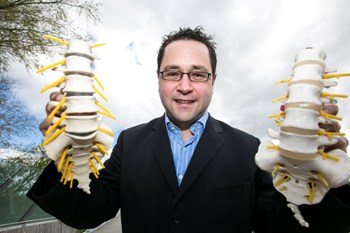May 28 2013
A University of Limerick research team have been awarded funding as part of a €5.8 million EU project. The project ‘Robomate’, aims to develop an exoskeleton for industrial applications. The UL research team have been awarded €480,000 to support their study on human-robot interaction for high frequency manual handling to minimise the risk of lower back injury in industry.
 Dr Leonard O’Sullivan, University of Limerick, Lead researcher on a study on human-robot interaction for high frequency manual handling to minimise the risk of lower back injury in industry. (Credit: Press 22)
Dr Leonard O’Sullivan, University of Limerick, Lead researcher on a study on human-robot interaction for high frequency manual handling to minimise the risk of lower back injury in industry. (Credit: Press 22)
Dr Leonard O’Sullivan, Lead researcher explains the significance of this study; “About 44 million EU workers are affected by work related musculoskeletal disorders every year, with an annual cost in excess of €240 billion euro to the European economy. The Robomate project aims to develop an exoskeleton for use in the workplace and in turn reduce back injury. Our team has extensive expertise in ergonomics and occupational health research, which, combined with our expanding research expertise in product design will determine key technology advances for the exoskeleton.
The European Foundation for Living and Work Conditions reports that 65% of workers perform lifting and carry loads for at least a quarter of their normal work time. Work related low back pain and injuries are the most common musculoskeletal disorders; these are directly related to frequent manual handling of heavy loads.
The UL research team is a collaboration between the Human Factors and Product Design Research Group and the Centre for Physical Activity and Health Research. Dr Leonard O’Sullivan is Co-Director of the Enterprise Research Centre and Lecturer at the Department of Design and Manufacturing Technology, University of Limerick.
The Robomate project, ‘Intelligent exoskeleton based on human-robot interaction for manipulation of heavy goods in Europe’s factories of the future’ is co-ordinated by Zurich University of Applied Science and involves 11 industry and academic partners from across Europe. The project is funded under Framework Programme 7.